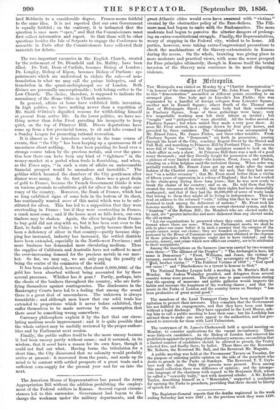The two important vacancies in the English Church, created by
the retirement of Dr. Blomfield and Dr. Maltby, have been filled. Dr. Tait, Dean of Carlisle, becomes Bishop of London ; Dr. Longley, Bishop of Ripon, becomes Bishop of-Durham: ap- pointments which are understood to violate the rule—of non- translation in what we may call the puisne bishoprics, and of translation in the quasi-archiepiscopal see of London. Both divines are personally unexceptionable ; both belong rather to the Low Church. The choice, therefore, is supposed to indicate the ascendancy of the Home Ofdc,e in Church matters.
In general, affairs at home have exhibited little invention. In high politics, we have nothing newer than a repetition of Mr. Smith O'Brien's dignified reasons for withholding himself at present from active life. In the lower politics, we have no- thing newer than John Frost parading his incapacity to keep quiet, on the top of Primrose Hill. Divers deputations have come up from a few provincial towns, to sit and take counsel in a Sunday League for promoting rational recreation.
It is almost as if to introduce variety in the tame course of events, that " the City " has been keeping up a. spontaneous fit of uneasiness about nothing. It has been puzzling its head over a strange course taken by the precious metals, and over the ques- tion how there can have been any kind of " tightness " in the money-market at a period when trade is flourishing, and when,
as the Times says, " in such a state of affairs an unfavourable financial prospect would be anomalous and incredible." The
goblins which haunted the slumbers of the City gentlemen after dinner were many. In the first place, there was a great drain of gold to France, because the French Government thinks it wise on various grounds to substitute gold for silver in the staple cur- rency of the country. Moreover, the Bank of France, which has so long exhibited signs of some hole in the bottom of its chest,
has continually wanted snore of this metal which was to be sub- stituted for silver. This has led to a supposition that they were overtrading in France : but if they were overtrading in France,
a crash must come ; and if the house next us falls down, our own timbers may be shaken. Again, the silver brought from France
to buy gold did not stop with us, but it has been sent over to the East, to India and to China ; to India, partly because there has been a deficiency of silver in that country—partly because ship- ping has increased, industry has increased, the settled districts have been extended, especially in the North-west Provinces ; and more business has demanded more circulating medium. Thus the supplies of California and Australia have not sufficed to meet the ever-increasing demand for the precious metals in our mar- ket. So far, we may say, we are only paying the penalty of being the centre of the commerce of the world.
It has been calculated, however, that about 6,000,0001. of the gold has been absorbed without being accounted for by these several processes. Whither has it gone ? Partly, perhaps, into the chests of the bankers throughout the country, who are forti- fying themselves against contingencies. The disclosures in the
Bankruptcy Courts have led to a feeling that among the sound there is a great deal of unsoundness. The unknown is always formidable ; and although men know that our solid trade has extended to proportions which it never before exhibited, they suffer themselves to be made nervous by the assumption that there must be something wrong somewhere.
Currency philosophers explain it by the fact that our circu- lating medium needs improvement : and it is quite possible that the whole subject may be usefully reviewed by the proper author- ities and by Parliament next session.
Finally, the public suffers itself to be the more uneasy because it had been uneasy partly without cause ; and it assumed, in its
wisdom, that it must have a reason for its own fears, though it
could not find out what. Having borne the tribulation for a short time, the City discovered that no calamity would probably arrive at present : it recovered from the panic, and made up its mind to be content with settled prospects of a great trade and a sufficient corn-supply for the present year and far on into the next.


























 Previous page
Previous page